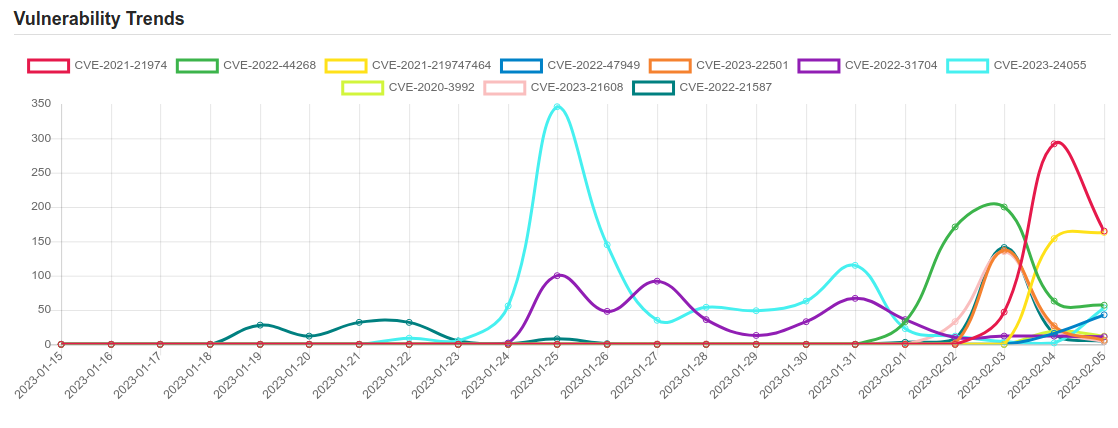Daily Vulnerability Trends: Mon Feb 06 2023

| CVE NAME | CVE Description |
| CVE-2022-27596 | A vulnerability has been reported to affect QNAP device running QuTS hero, QTS. If exploited, this vulnerability allows remote attackers to inject malicious code. We have already fixed this vulnerability in the following versions of QuTS hero, QTS: QuTS hero h5.0.1.2248 build 20221215 and later QTS 5.0.1.2234 build 20221201 and later |
| CVE-2023-0045 | No description provided |
| CVE-2023-22952 | In SugarCRM before 12.0. Hotfix 91155, a crafted request can inject custom PHP code through the EmailTemplates because of missing input validation. |
| CVE-2023-23924 | Dompdf is an HTML to PDF converter. The URI validation on dompdf 2.0.1 can be bypassed on SVG parsing by passing ` |
| CVE-2023-20076 | No description provided |
| CVE-2022-43551 | A vulnerability exists in curl <7.87.0 HSTS check that could be bypassed to trick it to keep using HTTP. Using its HSTS support, curl can be instructed to use HTTPS instead of using an insecure clear-text HTTP step even when HTTP is provided in the URL. However, the HSTS mechanism could be bypassed if the host name in the given URL first uses IDN characters that get replaced to ASCII counterparts as part of the IDN conversion. Like using the character UTF-8 U+3002 (IDEOGRAPHIC FULL STOP) instead of the common ASCII full stop (U+002E) `.`. Then in a subsequent request, it does not detect the HSTS state and makes a clear text transfer. Because it would store the info IDN encoded but look for it IDN decoded. |
| CVE-2022-0847 | A flaw was found in the way the “flags” member of the new pipe buffer structure was lacking proper initialization in copy_page_to_iter_pipe and push_pipe functions in the Linux kernel and could thus contain stale values. An unprivileged local user could use this flaw to write to pages in the page cache backed by read only files and as such escalate their privileges on the system. |
| CVE-2021-21972 | The vSphere Client (HTML5) contains a remote code execution vulnerability in a vCenter Server plugin. A malicious actor with network access to port 443 may exploit this issue to execute commands with unrestricted privileges on the underlying operating system that hosts vCenter Server. This affects VMware vCenter Server (7.x before 7.0 U1c, 6.7 before 6.7 U3l and 6.5 before 6.5 U3n) and VMware Cloud Foundation (4.x before 4.2 and 3.x before 3.10.1.2). |
| CVE-2021-21974 | OpenSLP as used in ESXi (7.0 before ESXi70U1c-17325551, 6.7 before ESXi670-202102401-SG, 6.5 before ESXi650-202102101-SG) has a heap-overflow vulnerability. A malicious actor residing within the same network segment as ESXi who has access to port 427 may be able to trigger the heap-overflow issue in OpenSLP service resulting in remote code execution. |
| CVE-2022-44268 | No description provided |
| CVE-2021-219747464 | No description provided |
| CVE-2022-47949 | The Nintendo NetworkBuffer class, as used in Animal Crossing: New Horizons before 2.0.6 and other products, allows remote attackers to execute arbitrary code via a large UDP packet that causes a buffer overflow, aka ENLBufferPwn. The victim must join a game session with the attacker. Other affected products include Mario Kart 7 before 1.2, Mario Kart 8, Mario Kart 8 Deluxe before 2.1.0, ARMS before 5.4.1, Splatoon, Splatoon 2 before 5.5.1, Splatoon 3 before late 2022, Super Mario Maker 2 before 3.0.2, and Nintendo Switch Sports before late 2022. |
| CVE-2023-22501 | An authentication vulnerability was discovered in Jira Service Management Server and Data Center which allows an attacker to impersonate another user and gain access to a Jira Service Management instance under certain circumstances_._ With write access to a User Directory and outgoing email enabled on a Jira Service Management instance, an attacker could gain access to signup tokens sent to users with accounts that have never been logged into. Access to these tokens can be obtained in two cases: * If the attacker is included on Jira issues or requests with these users, or * If the attacker is forwarded or otherwise gains access to emails containing a “View Request” link from these users. Bot accounts are particularly susceptible to this scenario. On instances with single sign-on, external customer accounts can be affected in projects where anyone can create their own account. |
| CVE-2022-31704 | The vRealize Log Insight contains a broken access control vulnerability. An unauthenticated malicious actor can remotely inject code into sensitive files of an impacted appliance which can result in remote code execution. |
| CVE-2023-24055 | ** DISPUTED ** KeePass through 2.53 (in a default installation) allows an attacker, who has write access to the XML configuration file, to obtain the cleartext passwords by adding an export trigger. NOTE: the vendor’s position is that the password database is not intended to be secure against an attacker who has that level of access to the local PC. |
A considerable amount of time and effort goes into maintaining this website, creating backend automation and creating new features and content for you to make actionable intelligence decisions. Everyone that supports the site helps enable new functionality.
If you like the site, please support us on Patreon using the button below

To keep up to date follow us on the below channels.





![[QILIN] - Ransomware Victim: vresystems[.]com 7 image](https://www.redpacketsecurity.com/wp-content/uploads/2024/09/image-300x300.png)

